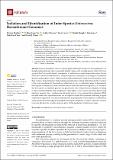Files in this item
Isolation and identification of inter-species Enterovirus recombinant genomes
Item metadata
| dc.contributor.author | Bentley, Kirsten | |
| dc.contributor.author | Tee, Han Kang | |
| dc.contributor.author | Pearson, Ashley | |
| dc.contributor.author | Lowry, Kym | |
| dc.contributor.author | Waugh, Sheila | |
| dc.contributor.author | Jones, Sian | |
| dc.contributor.author | Chan, Yoke Fun | |
| dc.contributor.author | Evans, David John | |
| dc.date.accessioned | 2021-11-29T15:30:07Z | |
| dc.date.available | 2021-11-29T15:30:07Z | |
| dc.date.issued | 2021-11-29 | |
| dc.identifier | 276859610 | |
| dc.identifier | 17c1289e-5b8e-46df-b4cc-d9b7ab24ee7d | |
| dc.identifier | 85120793620 | |
| dc.identifier | 000745294400001 | |
| dc.identifier.citation | Bentley , K , Tee , H K , Pearson , A , Lowry , K , Waugh , S , Jones , S , Chan , Y F & Evans , D J 2021 , ' Isolation and identification of inter-species Enterovirus recombinant genomes ' , Viruses , vol. 13 , no. 12 , 2390 . https://doi.org/10.3390/v13122390 | en |
| dc.identifier.issn | 1999-4915 | |
| dc.identifier.other | ORCID: /0000-0002-1315-4258/work/104252541 | |
| dc.identifier.other | ORCID: /0000-0002-6619-2098/work/104252619 | |
| dc.identifier.other | ORCID: /0000-0003-4183-985X/work/104252854 | |
| dc.identifier.uri | https://hdl.handle.net/10023/24427 | |
| dc.description | This research was funded by the Biotechnology and Biological Sciences Research Council (BB/M009343/1 to D.J.E), an ISSF award from The Wellcome Trust to the BSRC, University of St Andrews, and a Royal Society Newton Advanced Fellowship (NA160353 to Y.F.C). The APC was funded by The University of St Andrews. | en |
| dc.description.abstract | Positive-strand RNA virus evolution is partly attributed to the process of recombination. Although common between closely genetically related viruses, such as within species of the Enterovirus genus of the Picornaviridae family, inter-species recombination is rarely observed in nature. Recent studies have shown recombination is a ubiquitous process resulting in a wide range of recombinant genomes and progeny viruses. While not all recombinant genomes yield infectious virus progeny, their existence and continued evolution during replication has critical implications for evolution of the virus population. In this study we utilised an in vitro recombination assay to demonstrate inter-species recombination events between viruses from four enterovirus species’, A-D. We show that inter-species recombinant genomes are generated in vitro with polymerase template-switching events occurring within the virus polyprotein coding region. However, these genomes did not yield infectious progeny virus. Analysis and attempted recovery of a constructed recombinant cDNA revealed a restriction in positive- but not negative -strand RNA synthesis, indicating a significant block in replication. This study demonstrates the propensity for inter-species recombination at the genome level but suggests that significant sequence plasticity would be required in order to overcome blocks in the virus life cycle and allow for the production of infectious virus. | |
| dc.format.extent | 17 | |
| dc.format.extent | 2426157 | |
| dc.language.iso | eng | |
| dc.relation.ispartof | Viruses | en |
| dc.subject | Recombination | en |
| dc.subject | Enterovirus | en |
| dc.subject | Virus evolution | en |
| dc.subject | QR355 Virology | en |
| dc.subject | NDAS | en |
| dc.subject.lcc | QR355 | en |
| dc.title | Isolation and identification of inter-species Enterovirus recombinant genomes | en |
| dc.type | Journal article | en |
| dc.contributor.sponsor | The Wellcome Trust | en |
| dc.contributor.sponsor | BBSRC | en |
| dc.contributor.sponsor | The Royal Society | en |
| dc.contributor.institution | University of St Andrews. School of Biology | en |
| dc.contributor.institution | University of St Andrews. Sir James Mackenzie Institute for Early Diagnosis | en |
| dc.contributor.institution | University of St Andrews. Biomedical Sciences Research Complex | en |
| dc.identifier.doi | https://doi.org/10.3390/v13122390 | |
| dc.description.status | Peer reviewed | en |
| dc.identifier.url | https://www.mdpi.com/1999-4915/13/12/2390 | en |
| dc.identifier.grantnumber | en | |
| dc.identifier.grantnumber | BB/M009343/1 | en |
| dc.identifier.grantnumber | NA160353 | en |
This item appears in the following Collection(s)
Items in the St Andrews Research Repository are protected by copyright, with all rights reserved, unless otherwise indicated.

